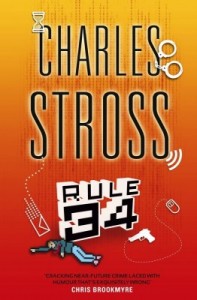So I’m less than one paragraph, not even a full line into Rule 34 and I read, “…and you’re coming to the end of your shift on the West End control desk”. I bite down on a sudden surge of frustration that threatens to overwhelm me.
The thing I disliked the most about the previous book by Charles Stross, Halting State, was the use of the second person perspective. “You’re” is the seventh word in this novel. A quick scan of the rest of the book seems to indicate the entire thing is written from my own point of view. I lose a fraction of a millimetre of enamel as my molars grind against each other in an involuntary expression of irritation, then I wrestle control of those muscles back from my subconscious.
I unclench. This is Stross’s second book in this universe, maybe he got better at using the second person and somehow it’s going to feel a little less like someone’s scratching the surface of my brain and then smearing tabasco on it.
What is Rule 34, anyway? Is there a rule 33? Turns out that Rule 34 is an internet meme, so we’re going to need to know what one of those is too. Rule 34, or the 34th rule of the internet, states that pornography or sexually-related material exists for every conceivable content, somewhere. In Stross’s universe, the Rule 34 police unit trawls and monitors the most disgusting things on the internet in an attempt to police the overspill of the aforementioned imaginative horrors into the real world.
Given that the world itself seems replete with filth of every conceivable kind, the unit is somewhat overtaxed, all the more so since it’s considered a not-very-good-place to be assigned, so it’s long on deliverables and short on talent.
The local police force (because we’re in Edinburgh, in an independent Scotland), is suddenly dealing with a very twisted and somewhat revolting death caused – it would seem – by foul dealings of a very technologically sophisticated kind, and this death turns out to be the small and phallically-protruding tip of an iceberg of mammoth proportions.
By the time I’ve understood all this, my subconscious has more or less made peace with the second person perspective, but every time I put the book down and pick it up again, the shock of (self?) recognition causes my sense of style to grumble indignantly and I’m running the risk of a premature enamel shortage.
I find the book hard going. The Scottish dialect is deliberately kicking the glass house of story immersion and reminding me I’m turning the (virtual) pages of a (digital) book. As cracks appear in my acceptance of Stross’s reality, only a lifetime of polite upbringing prevents me from cursing the author by name for his love affair with phonetic spellings of accents that hail from beyond Hadrian’s wall. Nevertheless, I soldier on.
Somehow, two thirds of the way through the book, I find that I am closer to the end than I thought, and that I am anticipating the dénouement. A short period of life spent in Glasgow many years ago perhaps makes the style more approachable for me than some, and the interaction between new technology and the people in Stross’s universe is, after all, very well thought through. Oh God, am I actually enjoying this now?
I’m almost bitter that I’ve been tricked into liking a book written in the second person (actually a great variety of second persons that get quite confusing at times, you might want to dial it down a bit next time). I’m also, to my immense distaste, accepting the fact that some of the characters would have been impossible to understand had we not been put into their heads (thankfully with some editing-out of the more repulsive thoughts). Therefore the use of the second person does – am I actually agreeing with this? – serve a real purpose here.
The final page flickers briefly across my eReader as I swipe from right to left and I’m presented with a list of other books by Charles Stross. What? That’s how it ends? Also: steady on, I’ve bought two of his books already, one thing at a time. But here’s the thing: while I had a hard time with it to start, and it clearly required more effort than many books to get into, against all expectations, I actually enjoyed this. Despite some story elements that are – to say the least – quite disturbing.
The story doesn’t end so much as fall off the edge of a cliff, with a deus-ex-machina-esque wrap-up that’s almost as sudden and unexplained as Don Juan taking the statue’s hand for a one-way trip to hell. I realise I’m not sure what the motivation of some of the characters really is, or that I have fully understood what happened, or even if I have enough information to attempt a full understanding.
But this doesn’t matter, because the story was actually less important than the people who inhabit it. The mystery we’re following is too convoluted to lend itself to a casual understanding, and too much is left unexplained (especially to a financially-trained person) for it to hang together nicely, but by the end, I was in it for the scenery, I wanted to know what happened to the characters, and I was just enjoying the descriptions of how the technology changes our interactions with the world around us, and with each other.



